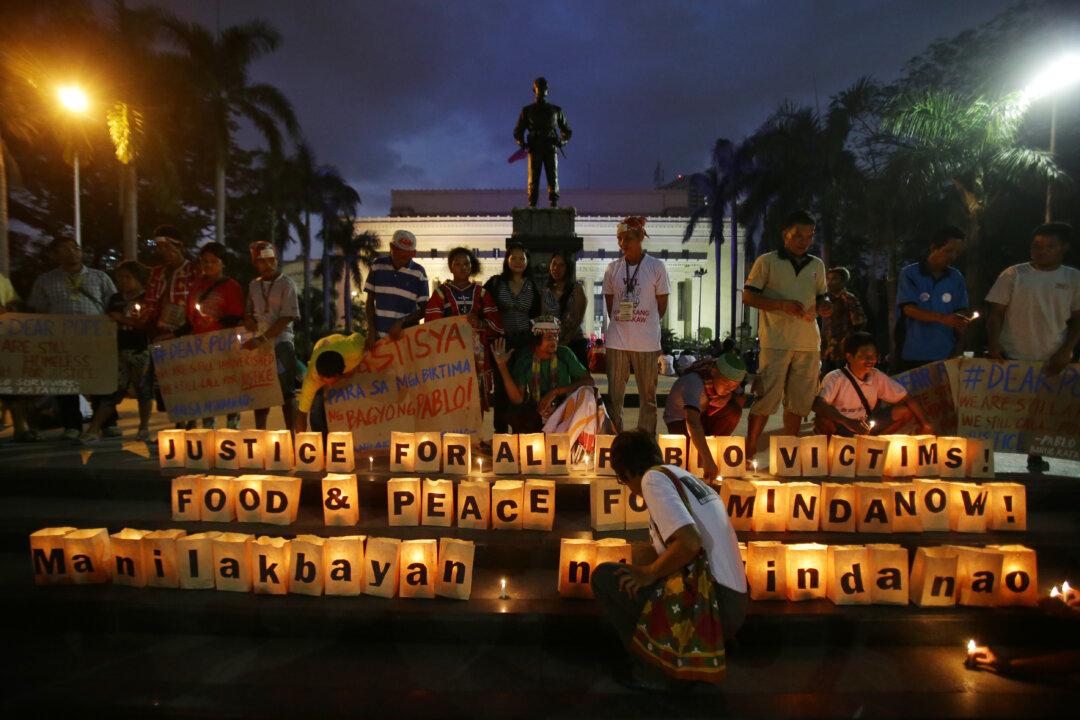MANILA, Philippines—Villagers in the central Philippines fled coastal homes and triggered panic-buying in grocery stores and gas stations as a fast-approaching powerful storm brought back nightmares of last year’s deadly onslaught of Typhoon Haiyan.
Typhoon Hagupit — Filipino for “smash” — was packing sustained winds of 205 kilometers (127 miles) per hour and gusts of up to 240 kph (149 mph) over the Pacific, about 700 kilometers (435 miles) off the country’s eastern coast. Forecasts show it may hit Eastern Samar province on Saturday and barrel inland along the same route where Haiyan leveled villages and left more than 7,300 dead and missing in November last year.
Haiyan survivor Emily Sagales said many of her still-edgy neighbors in central Tacloban city, which was ravaged by Haiyan, packed their clothes and fled to a sports stadium and safer homes of relatives. Long lines formed at grocery stores and gas stations as residents stocked up on basic goods, she said.
“The trauma has returned,” the 23-year-old Sagales said. In the wake of last year’s typhoon, which killed her mother-in-law and washed away her home, she gave birth to her first child, a girl, in a crowded makeshift clinic filled with the injured and the dying near the Tacloban airport.
“It’s worse now because I didn’t have a baby to worry about last year,” she said.
Haiyan demolished about 1 million houses and displaced about 4 million people in the central Philippines. Hundreds of residents still living in tents in Tacloban have been prioritized in an ongoing evacuation.
Hotels in Tacloban, a city of more than 200,000 people still struggling to recover from last year’s massive damage, were running out of rooms as wealthier families booked ahead for the weekend.
“The sun is still shining but people are obviously scared. Almost all of our rooms have been booked,” said Roan Florendo of the hilltop Leyte Park hotel, which lies near San Pedro Bay in Tacloban.
The government put the military on full alert, workers opened evacuation centers and transported food packs, medicines and body bags to far-flung villages, which could be cut off by heavy rains.
In Manila, President Benigno Aquino III on Thursday led an emergency meeting of disaster-response agencies and ordered steps to prevent panic-buying and hoarding of goods.
Aquino checked on the readiness of Philippine air force aircraft, hospitals and police contingency plans to deal with possible looting similar to what happened in Tacloban after Haiyan crippled the city’s police force.
“I think we’ve been challenged worse by Yolanda,” Aquino told officials, referring to Haiyan’s local name. But during the nationally televised meeting, he was told the typhoon had gained strength.
Initially, forecasters said there was a chance the typhoon could veer north away from the Philippines in the direction of Japan. Science and Technology Secretary Mario Montejo, however, told Aquino on Thursday it was almost certain it would slam into the country’s eastern coast facing the Pacific.
Some towns in the typhoon’s predicted path said they will shut schools on Friday. Inter-island ferries and some commercial flights were canceled.
The government also decided to move the venue of a meeting next week of the Asia-Pacific Economic Cooperation forum, which was to be attended by hundreds of diplomats from 21 member economies, from Albay province, which could be lashed by the typhoon, to the capital, Manila, which forecasters say will likely be spared.





